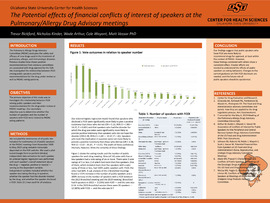| dc.contributor.author | Bickford, Trevor | |
| dc.contributor.author | Kinder, Nicholas | |
| dc.contributor.author | Arthur, Wade | |
| dc.contributor.author | Wayant, Cole | |
| dc.contributor.author | Vassar, Matt | |
| dc.date.accessioned | 2020-05-05T19:37:52Z | |
| dc.date.available | 2020-05-05T19:37:52Z | |
| dc.date.issued | 2020-02-28 | |
| dc.identifier | ouhd_bickford_potentialeffectsoffinancial_2020 | |
| dc.identifier.citation | Bickford, T., Kinder, N., Arthur, W., Wayant, C., & Vassar, M. (2020, Feb. 28). The potential effects of financial conflicts of interest of speakers at the Pulmonary/Allergy Drug Advisory meetings. Poster presented at Research Day at Oklahoma State University Center for Health Sciences, Tulsa, OK. | |
| dc.identifier.uri | https://hdl.handle.net/11244/324228 | |
| dc.description.abstract | Rationale: The Pulmonary-Allergy Drugs Advisory Committee (PADAC) evaluates the safety and efficacy of new drugs used in the treatment of pulmonary, allergic, and immunologic diseases. Previous studies have shown, however, that positive recommendations from advisory committees are associated with drug approval by the FDA in up to 79% of cases. | |
| dc.description.abstract | Objective: To investigate the relationship between FCOI among public speakers and their recommendations for the drug under review at PADAC meetings and to determine whether the number of speakers and the number of speakers with FOCI were related to PADAC voting patterns. | |
| dc.description.abstract | Methods: We included the testimonies of all public speakers at the PADAC meetings from November 2009 to May 2019 using verbatim transcripts deposited on the FDA website. We used a pilot tested Google form to perform blinded, independent data extraction for each speaker. An ordered logistic regression was performed with each speaker's overall statement about the drug — negative, positive or neutral — serving as the dependent variable. Independent variables included whether the speaker was taking the drug in question, whether the speaker had the disorder treated by the drug, and whether the speaker disclosed a FCOI. Stata 15.1 was used for all analyses. | |
| dc.description.abstract | Results: From 16 PADAC meetings, we extracted data for 128 speakers. From all meetings included in our sample, 38% (49/128) disclosed a FCOI. Our ordered logistic regression model found that speakers who disclosed a FCOI were significantly more likely to give a positive testimony than those who did not (OR = 5.13, 95% CI = 1.83—14.37, P < 0.001) and that speakers who had the disorder for which the drug was taken were significantly more likely to provide positive testimony than speakers who did not have the disorder (OR=5.49, 95% CI = 1.84 — 14.37, P < .01). | |
| dc.description.abstract | Conclusion: Our findings suggest that public speakers who have FCOI are more likely to recommend drugs for approval, at least within the context of PADAC. However, these findings combined with others show a consistent effect. Greater efforts are needed to understand the effects of public speakers on voting behaviors. Changes to the current guidance on FDA FCOI disclosure are needed, and the future role of public speakers should be questioned. | |
| dc.format | application/pdf | |
| dc.language | en_US | |
| dc.publisher | Oklahoma State University Center for Health Services | |
| dc.rights | The author(s) retain the copyright of have the right to deposit the item giving the Oklahoma State University Library a limited, non-exclusive right to share this material in its institutional repository. Contact Digital Resources and Discovery Services at lib-dis@okstate.edu or 405-744-9161 for the permission policy on the use, reproduction or distribution of this material. | |
| dc.title | Potential effects of financial conflicts of interest of speakers at the Pulmonary/Allergy Drug Advisory meetings | |
| osu.filename | ouhd_bickford_potentialeffectsoffinancial_2020.pdf | |
| dc.type.genre | Presentation | |
| dc.type.material | Text | |
| dc.subject.keywords | financial | |
| dc.subject.keywords | conflicts | |
| dc.subject.keywords | drugs | |
| dc.subject.keywords | advisory | |
| dc.subject.keywords | committee | |
